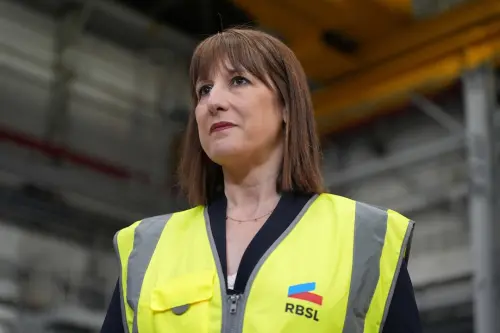British finance minister Rachel Reeves is expected to announce cuts to her spending plans on Wednesday to reassure investors of her commitment to restoring public finances.
With the 2025 economic outlook set to be revised downward and borrowing costs rising in recent days, Reeves has indicated her readiness to tighten government expenditures to meet budget targets.
Reeves and Prime Minister Keir Starmer promised voters last year to manage the economy responsibly. However, growth has slowed, and demands for increased spending have surged, particularly as Europe faces reduced U.S. protection.
The Treasury has stated that Reeves will unveil £2.2 billion ($2.9 billion) in additional defense spending for the upcoming financial year, part of Starmer's commitment to raise defense expenditure to 2.5% of economic output by 2027.
In her fiscal update to Parliament, Reeves is expected to emphasize the need to secure Britain's future in a rapidly changing global landscape.
She has attributed much of the weak economic outlook to upheaval in the market, which is grappling with the impact of U.S. policies.
Employers have expressed concerns that a significant tax increase, set to take effect next month, will lead to higher prices and complicate the government's growth objectives.
Recently, the center-left Labour government outlined plans to save around £5 billion annually, which accounts for about half the anticipated shortfall in Reeves' budget strategy. Reports suggest that Britain's budget watchdog believes the welfare changes will yield £1.6 billion less in savings than the government's estimate, prompting Reeves to reduce benefits by an additional £500 million and cover the remaining gap through slower increases in other public spending.
Reeves has also indicated that up to 10,000 public sector jobs may be cut, with potential savings arising from reallocating funds from overseas aid to the defense budget.
Some Labour lawmakers have expressed alarm over these cuts, especially after years of constrained spending in various government areas under the previous Conservative administration.
The Office for Budget Responsibility is projected to lower its forecast for 2% economic growth this year. The Bank of England has halved its forecast to just 0.75%.
Reeves points to the Organisation for Economic Cooperation and Development's latest forecast of 1.4% growth for this year, down from a previous estimate of 1.7%, but still the second-fastest among the Group of Seven nations after the U.S.
She maintains that overall day-to-day public spending will exceed inflation in the coming years, though it will prioritize critical areas.
Determined to avoid the missteps of 2022, when former Conservative Prime Minister Liz Truss proposed tax cuts without a coherent fiscal plan, Reeves is navigating a challenging economic landscape.
British debt costs have increased recently. Some investors are questioning how Reeves plans to achieve her goal of balancing day-to-day spending with tax revenues by 2030 amid weak growth.
Some Labour supporters have pointed to European Union proposals for exemptions to budget rules, which would allow for increased national defense spending, while Germany has lifted its borrowing cap as part of a significant spending initiative.
Paul Mortimer-Lee, a research fellow at the National Institute of Economic and Social Research, emphasized that Reeves may ultimately need to raise taxes to meet her targets.
"This is not rocket science. You can't significantly cut spending, and there's no mandate for that," Mortimer-Lee stated. "The only way to address this is by raising taxes."
While Reeves and Starmer assured voters they would not increase income tax or other major revenue sources, they might extend the freeze on the thresholds for basic and higher rates of income tax, thereby pulling more individuals into the tax system.
